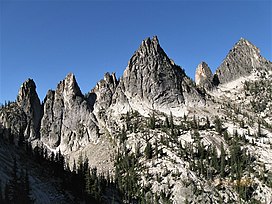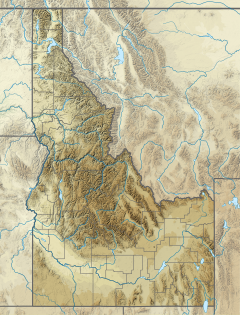Fishfin Ridge is a 9,700-foot elevation (2,957 m) mountain ridge located in Lemhi County, Idaho, United States.
| Fishfin Ridge | |
|---|---|
 Fishfin Ridge, northeast aspect | |
| Highest point | |
| Elevation | 9,700 ft (2,957 m)[1] |
| Prominence | 360 ft (110 m)[1] |
| Isolation | 0.44 mi (0.71 km)[2] |
| Coordinates | 45°08′47″N 114°35′11″W / 45.1465200°N 114.5864029°W[3] |
| Geography | |
| Location | Frank Church–River of No Return Wilderness |
| Country | United States of America |
| State | Idaho |
| County | Lemhi |
| Parent range | Bighorn Crags Salmon River Mountains Rocky Mountains |
| Topo map | USGS Mount McGuire |
| Geology | |
| Rock age | Eocene[4] |
| Mountain type | Ridge |
| Rock type | Granite[4] |
| Climbing | |
| First ascent | 1955 |
| Easiest route | class 5.2 climbing[2] |
Description
editFishfin Ridge is part of the Bighorn Crags in the Salmon River Mountains which are a subset of the Rocky Mountains.[5] The remote ridge is situated 30 miles west of Salmon, Idaho, in the Frank Church–River of No Return Wilderness. An approach is possible from July through October via a multi-day backpacking trip along trails.[6] Precipitation runoff from the mountain drains to the Salmon River via Clear Creek (north slope) and Wilson Creek (south slope). Topographic relief is modest as the summit rises 1,700 feet (520 meters) above Clear Creek in approximately one mile. This landform's toponym has been officially adopted by the United States Board on Geographic Names,[3] and the highest point is unofficially known as "Knuckle Peak."[1] The first ascent of Knuckle Peak was made by Lincoln Hales and Pete Schoening in 1955.[1] Fishfin Ridge was named in 1962 by Dr. Paul Dilke of University of Idaho because it looks like a dorsal fin of a prehistoric fish.[7]
Climate
editBased on the Köppen climate classification, Fishfin Ridge is located in an alpine subarctic climate zone with long, cold, snowy winters, and cool to warm summers.[8] Winter temperatures can drop below −10 °F with wind chill factors below −30 °F.
See also
editReferences
edit- ^ a b c d "Idaho: A Climbing Guide, Knuckle Peak (Fishfin Ridge)". idahoaclimbingguide.com. Retrieved 2022-09-29.
- ^ a b "Fishfin Ridge - 9,700' ID". listsofjohn.com. Retrieved 2022-09-29.
- ^ a b "Fishfin Ridge". Geographic Names Information System. United States Geological Survey, United States Department of the Interior. Retrieved 2022-09-29.
- ^ a b William N. Orr, Elizabeth L. Orr (2006), Geology of the Pacific Northwest, Second Edition, Waveland Press, ISBN 9781478609872, p. 169
- ^ "Fishfin Ridge, Idaho". Peakbagger.com. Retrieved 2022-09-29.
- ^ Douglas Lorain (2015), Backpacking Idaho, Wilderness Press, ISBN 9780899977744, p. 93
- ^ Susanne Smith (1991), Recreation Guide to the North Fork Ranger District and the Salmon National Forest, U.S. Department of Agriculture, Forest Service, Intermountain Region, p. 28
- ^ Peel, M. C.; Finlayson, B. L.; McMahon, T. A. (2007). "Updated world map of the Köppen−Geiger climate classification". Hydrol. Earth Syst. Sci. 11: 1633–1644. ISSN 1027-5606.
External links
edit- Fishfin Ridge: Idaho: A Climbing Guide
- Fishfin Ridge: weather forecast
- Fishfin Ridge (photo): Flickr

